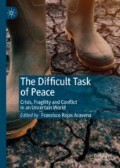Abstract
All religions have worldviews and their followers become defensive when threatened. We can find examples of numerous religious-fundamentalist movements, such as Islamic, Hindu, Jewish, and Christian. The September 11 terrorist attacks on the United States brought attention to Islamic fundamentalism and extremism. This led to investment in educational reforms and programs on peace education; however, a more specialized term of “countering violent extremism (CVE)” was coined and/or promoted during the White House Summit on CVE in 2015. This chapter aims to understand how fundamentalism and violent extremism are defined in relation to the prominent religions, such as Christianity, Islam, Hinduism, and Buddhism. The analysis will focus on differential treatment of the followers of the selected faiths in the literature on violent extremism and terrorism and programs on CVE.
Access this chapter
Tax calculation will be finalised at checkout
Purchases are for personal use only
Notes
- 1.
Rushdie received much criticism and blasphemy charges from Muslim clerics around the world after publishing his book The Satanic Verses. In 1989, Ayatollah Khomeini of Iran issued a fatwa demanding Muslims to kill Rushdie.
- 2.
For more information about groups working on CVE in different parts of the world visit www.peaceinsight.org.
References
Abdel-Fattah, Randa. 2015. The Stigmatisation of Muslims as ‘Could-Be Terrorists’ Has Produced a Toxic Social Order. The Guardian, October 9. https://www.theguardian.com/commentisfree/2015/oct/09/the-stigmatisation-of-muslims-as-could-be-terrorists-has-produced-a-toxic-social-order.
Ahmed, Zahid Shahab. 2017. Countering Violent Extremism in Pakistan. Asian Currents. Last Modified 29 June. http://asaa.asn.au/countering-violent-extremism-pakistan/
———. 2018. A Critique of the Need and Application of Peace Education in Pakistan. Asian Journal of Peacebuilding 6 (1): 99–112.
Almond, Gabriel A., R. Scott Appleby, and Emmanuel Sivan. 2003. Strong Religion: The Rise of Fundamentalisms Around the World. University of Chicago Press.
Altemeyer, Bob, and Bruce Hunsberger. 1992. Authoritarianism, Religious Fundamentalism, Quest, and Prejudice. International Journal for the Psychology of Religion 2 (2): 113–133.
Altemeyer, Robert. 1996. The Authoritarian Specter. Harvard University Press.
Anand, Dibyesh. 2016. Hindu Nationalism in India and the Politics of Fear. Springer.
Ben-Dor, Gabriel, and Ami Pedahzur. 2010. The Uniqueness of Islamic Fundamentalism and the Fourth Wave of International Terrorism. Totalitarian Movements and Political Religions 4 (3): 71–90.
Bruce, Steve. 2008. Fundamentalism. Polity.
Choueiri, Youssef M. 2010. Islamic Fundamentalism 3rd Edition: The Story of Islamist Movements. A&C Black.
Emerson, Michael O., and David Hartman. 2006. The Rise of Religious Fundamentalism. Annual Review of Sociology 32: 127–144.
Esposito, John L. 1999. The Islamic Threat: Myth or Reality? Oxford University Press.
Feige, Michael. 2009. Settling in the Hearts: Jewish Fundamentalism in the Occupied Territories. Wayne State University Press.
Fransen, Rosalie. 2017. National Action Plans on Preventing Violent Extremism: A Gendered Content Analysis. Washington: International Civil Society Action Network.
Hood, Ralph W., Peter C. Hill, and William Paul Williamson. 2005. The Psychology of Religious Fundamentalism. Guilford Press.
Huntington, Samuel P. 1997. The Clash of Civilizations and the Remaking of the World Order. New Delhi: Penguin Books India.
Hussain, Murtaza. 2018. Federal “Countering Violent Extremism” Grants Focus on Minority Communities—Including in Schools. The Intercept, Last Modified 15 June. https://theintercept.com/2018/06/15/cve-grants-muslim-surveillance-brennan-center/
Kar, Debi. 2015. Countering Violent Extremism (CVE). Muslim Advocates, Last Modified 9 March. https://www.muslimadvocates.org/cve-countering-violent-extremism/
Kerr, Peter A. 2003. The Framing of Fundamentalist Christians: Network Television News, 1980–2000. Journal of Media and Religion 2 (4): 203–235.
Koopmans, Ruud. 2015. Religious Fundamentalism and Hostility Against Out-Groups: A Comparison of Muslims and Christians in Western Europe. Journal of Ethnic and Migration Studies 41 (1): 33–57.
Kramer, Martin. 2003. Coming to Terms: Fundamentalists or Islamists? Middle East Quarterly 10 (2): 65–77.
Lawrence, Bruce B. 1989. Defenders of God: The Fundamentalist Revolt Against the Modern Age. HarperCollins Publishers.
Mamdani, Mahmood. 2004. Good Muslim, Bad Muslim. UNISA Press.
Marty, Martin E., and Appleby R. Scott, eds. 1993. Fundamentalism of the State: Remaking Polities, Economies, and Militance. Chicago: The University of Chicago Press.
Milton-Edwards, Beverley. 2013. Islamic Fundamentalism Since 1945. Routledge.
Mucha, Witold. 2017. Polarization, Stigmatization, Radicalization. Counterterrorism and Homeland Security in France and Germany. Journal of Deradicalization 10: 230–254.
PD. 2017. Local Approaches to Preventing Violent Extremism in Pakistan. London: Peace Direct.
Ruthven, Malise. 2005. Fundamentalism: The Search for Meaning. Oxford University Press on Demand.
———. 2007. Fundamentalism: A Very Short Introduction. Vol. 155. Oxford University Press.
Said, Edward W. 2008. Covering Islam: How the Media and the Experts Determine How We See the Rest of the World. Fully Rev. ed. Random House.
Saleh, Maryam. 2017. Changing CVE to Focus on Islam Is Counterproductive, Critics Say. U.S. News, February 2. https://www.usnews.com/news/national-news/articles/2017-02-02/changing-cve-to-focus-on-islam-is-counterproductive-critics-say
Savage, Sara, and Jose Liht. 2008. Mapping Fundamentalisms: The Psychology of Religion as a Sub-discipline in the Understanding of Religiously Motivated Violence. Archive for the Psychology of Religion/Archiv fr Religionspsychologie 30: 75.
Sayyid, Salman. 2004. A Fundamental Fear: Eurocentrism and the Emergence of Islamism. Zed Books Ltd.
Shahak, Israel, and Norton Mezvinsky. 1999. Jewish Fundamentalism in Israel. London: Pluto Press.
Sidahmed, Abdel Salam, and Anoushiravan Ehteshami. 2018. Islamic Fundamentalism. Routledge.
UNESCO. 2017. Preventing Violent Extremism Through Education: A Guide for Policy-makers. Paris: United Nations Educational, Scientific and Cultural Organisation.
Vergani, Matteo. 2017. The Alarming Truth About Countering Violent Extremism Programs: We Don’t Know What Works. The Interpreter, Last Modified 17 April. https://www.lowyinstitute.org/the-interpreter/alarming-truth-about-countering-violent-extremism-programs-we-don-t-know-what-works
Warsame, Abdi. 2017. Countering Violent Extremism Program Divides Communities, Perpetuates Islamophobia. Star Tribune, February 13. http://www.startribune.com/countering-violent-extremism-program-divides-communities-perpetuates-islamophobia/413648443/
Wilcox, Clyde. 2018. Onward Christian Soldiers?: The Religious Right in American Politics. Routledge.
Wood, Simon A., and David Harrington Watt, eds. 2014. Fundamentalism: Perspectives on a Contested History. University of South Carolina Press.
Author information
Authors and Affiliations
Corresponding author
Editor information
Editors and Affiliations
Rights and permissions
Copyright information
© 2020 The Author(s)
About this chapter
Cite this chapter
Ahmed, Z.S., Bashirov, G. (2020). Religious Fundamentalism and Violent Extremism. In: Rojas Aravena, F. (eds) The Difficult Task of Peace. Palgrave Macmillan, Cham. https://doi.org/10.1007/978-3-030-21974-1_11
Download citation
DOI: https://doi.org/10.1007/978-3-030-21974-1_11
Published:
Publisher Name: Palgrave Macmillan, Cham
Print ISBN: 978-3-030-21973-4
Online ISBN: 978-3-030-21974-1
eBook Packages: Political Science and International StudiesPolitical Science and International Studies (R0)

